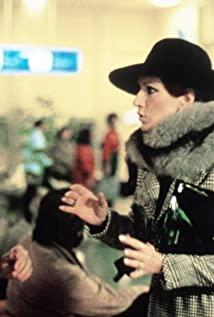picture progressed, it was a wall full of movie posters, some of which were torn off, layered on top of each other, just like the title. The words are telling something with jumping colors... The
camera continues to zoom in... There is a small horn that has not been torn off on the poster. When zoomed out, the poster is still intact, and the story unfolds with the plot in Iglesio's script...
The poster In a small theater, Iglei, dressed as a woman, meets Enrique again...with him in a Nimbus that he has dreamed of since his first childhood love. He began to recall the encounter between the two sons, the church school, and the molestation of his priest as a child... The two flirted with the rhythm of the Catholic hymn, which was both beautiful and ironic - Catholics believe that same-sex love is sin, but their love is as holy The song is generally pure.
"The blood split my head, and I suddenly felt that my life was split ...
" After Iglesio was injured by the priest's obscene struggle, a ray of blood dripped from his fair face, and the picture was followed by the traces of blood. The split, the film returned from the script to reality...
The first half of the film was intertwined between Iglesiao's script and reality, and gradually Enrique felt that this was a good story when Enrique decided to direct Iglesias After Ao's movie, the movie entered a bit of a weird state - Iglesio was swimming in Enrique's house but hiding in the pool wall with a complicated expression. At this time, the story really started. It turned out that everything just now was just a lie... .The
two had a dispute over the role. Enrique felt that Iglesio was not like back then, that he could not perform as needed. After all, this was their best memory, and he did not want to destroy it. And Iglesiao insisted on acting. In the end, Enrique and Iglesio re-established their relationship, and everything seemed to develop normally until the film was completed, and the visit of the priest in the film told Enrique everything.
In fact, Enrique knew for a long time that Iglecio died four years ago... It was his younger brother Ngawang who found Enrique, but what he didn't know was that it was Ngawang who was with the priest. Killed... The ups and downs of the second half of the film make it difficult to understand, but it makes sense when you think about it carefully.
The story ends with Enrique driving Awang away from his home, and Awang gave Enrique a piece of paper, which was the last relic left by Iglecio - "Enrique: I think I succeeded. ..." While leaving this piece of paper, the fallen Iglesiao was about to start anew...and then he was greeted by death. He thought his revenge against the priest was successful, but he didn't expect that he would be the ultimate victim.
Everyone in the film has sins, and they are happy because of their sins but also pay a painful price -
Enrique and Iglesio were punished for secretly tasting the forbidden fruit in childhood, causing the two to be forced to separate; Iglesio destroyed himself step by step because he wanted to take revenge on the priest who hurt him in his childhood; Ngawang was unable to bear the dual mental and financial embarrassment of taking care of a drug addict brother, and became murderous, and eventually turned his back on him. In order to repay, he hoped to fulfill his brother's wish, so he pretended to be his brother to find his first love and successfully filmed a movie based on his brother's story, but in the process he couldn't help falling in love with his brother's first love. And then abandoned; the priest fell in love with Iglesiao's unfaithful love, which caused him to fall out of God's arms, and fell in love with Iglesiao's brother Ngawang by accident, but finally because of He was disgraced and died on the street...
The seven deadly sins - arrogance, jealousy, rage, laziness, greed, gluttony and lust, are all reflected in this film, but these seven deadly sins can also be summed up in one word, that is love. (Love oneself leads to arrogance, to love one’s name and flower to owner leads to jealousy, to get what you love leads to rage, to love leisure leads to laziness, to love that cannot be satisfied is greed, to love to eat is to gluttony, and Lust is the physical manifestation of love... In other words, I'm not a believer, but I don't really understand the seven deadly sins... I understand it based on my own feelings... If it goes against the doctrine, please ignore this paragraph...)
Yes, the most beautiful word in this world is the origin of the seven deadly sins - everything starts with love, and love swallowed by the seven deadly sins is a kind of bad education. People take the road of no return. Bad education affects the people around you at the same time. Since it is an education, it will spread and spread until it becomes a vicious circle...
"From this moment on, I no longer believe in heaven and hell, because I don't believe in hell, so I can do whatever I want... "I remember Iglecio said this sentence in the film, the priest's bad love for him caused him to no longer believe in the holiness of God, but also led him to embark on the road of indulging in revenge... But this sentence is also very good conveys the idea of the entire film.
In fact, I think another translated title of this film can better show the center of the film - "Saint. Teaching. Desire".
In addition, there are many classic French music in the film, and the accompaniment is also commendable. The grandeur of the symphony is very exciting and pushes the final despair to the extreme, and the sanctity of the chants is even more ironic. As for some blues, Basa Nova is better of different emotions. Iglesio's childhood singing of Moon River is the purest version I've ever heard. Compared with the absurdity at the beginning of the film and the final madness and despair, this pure singing is the best irony - each of us has ever been. It's so holy and so beautiful....
At the end of the film, Enrique leaned against the door in despair, and the subtitles next to them showed what happened after them - Ngawang's popularity and fall, the priest's entanglement with Ngawang until he was hit by Ngawang Death, and Enrique, who is still filming with passion... In the
end, the extremely enlarged passion that fills the screen gradually becomes blurred... It is the excessive love that blurs our vision, and the passion will eventually swallow everything... Perseverance Love is a bad education.
Bad education - an obsessive love, a soul devoured by the seven deadly sins.
Ps: It is said that the director himself is a homosexual, and this film has his autobiographical color. How did the filmmaker who made such a despairing film endure such despair himself?
View more about Bad Education reviews











